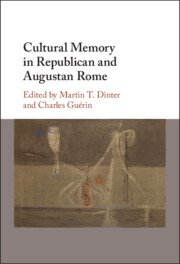Book contents
- Cultural Memory in Republican and Augustan Rome
- Cultural Memory in Republican and Augustan Rome
- Copyright page
- Contents
- Figures
- Contributors
- Acknowledgements
- Chapter 1 Introduction: What is Cultural Memory?
- Part I Writing Cultural Memory
- Part II Politicising Cultural Memory
- Part III Building Cultural Memory
- Chapter 15 Sites of Exemplarity and the Challenge of Accessing the Cultural Memory of the Republic
- Chapter 16 The Festival of the Lupercalia as a Vehicle of Cultural Memory in the Roman Republic
- Chapter 17 Inscriptions on the Capitoline: Epigraphy and Cultural Memory in Livy
- Chapter 18 Cultural Memory and the Role of the Architect in Vitruvius’ De Architectura
- Part IV Locating Cultural Memory
- Bibliography
- Index Locorum
- Index
Chapter 16 - The Festival of the Lupercalia as a Vehicle of Cultural Memory in the Roman Republic
from Part III - Building Cultural Memory
Published online by Cambridge University Press: 27 April 2023
- Cultural Memory in Republican and Augustan Rome
- Cultural Memory in Republican and Augustan Rome
- Copyright page
- Contents
- Figures
- Contributors
- Acknowledgements
- Chapter 1 Introduction: What is Cultural Memory?
- Part I Writing Cultural Memory
- Part II Politicising Cultural Memory
- Part III Building Cultural Memory
- Chapter 15 Sites of Exemplarity and the Challenge of Accessing the Cultural Memory of the Republic
- Chapter 16 The Festival of the Lupercalia as a Vehicle of Cultural Memory in the Roman Republic
- Chapter 17 Inscriptions on the Capitoline: Epigraphy and Cultural Memory in Livy
- Chapter 18 Cultural Memory and the Role of the Architect in Vitruvius’ De Architectura
- Part IV Locating Cultural Memory
- Bibliography
- Index Locorum
- Index
Summary
The early history of Rome has long been subjected to various forms of criticism. I am told that public-school boys in the United Kingdom used to read whole books of Livy’s history, which they (in turn) were told was the work of his imagination, and this view has become a communicative memory still propagated by many historians. This unstable construct began to shake under the weight of Ogilvie’s voluminous commentary (and its continuation by Oakley).1 A serious modern reconsideration began with Tim Cornell’s monograph The Beginnings of Rome in which he argued for the internal consistency of the traditions on early Rome.2 Cornell made the case that the main body of narrative is likely to go back a long way and shows a structure that could not simply be invented by historians of the late Republic and early Principate. Given that Roman historiography started only in the second half of the third century BC, there is a gap of several centuries between this and the regal period (traditionally dated 753–509 BC).3 Accordingly, if there was any earlier material, it must have been transmitted by means other than formal historiography, and oral tradition seems like the obvious candidate.
Keywords
- Type
- Chapter
- Information
- Cultural Memory in Republican and Augustan Rome , pp. 281 - 293Publisher: Cambridge University PressPrint publication year: 2023



